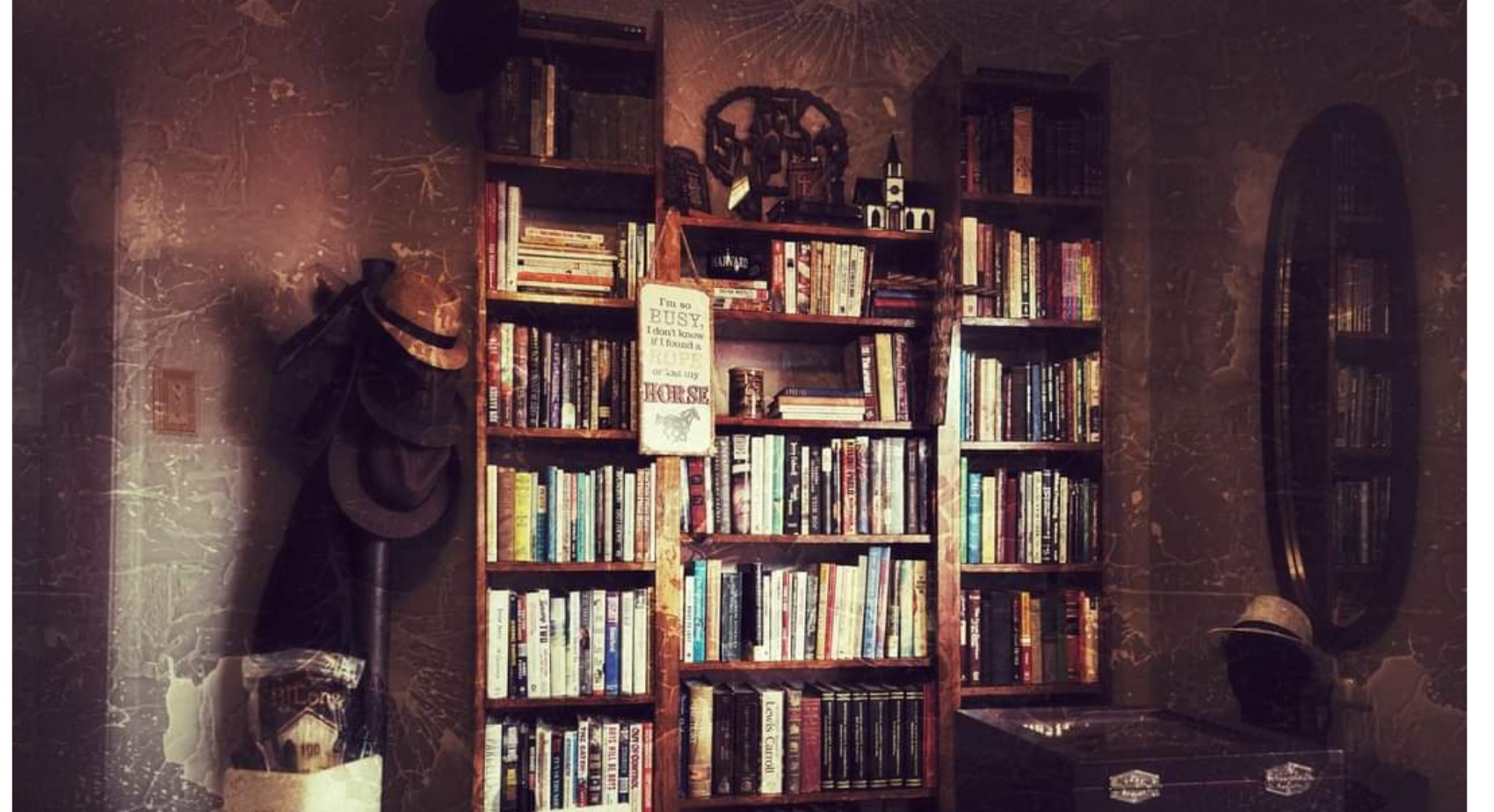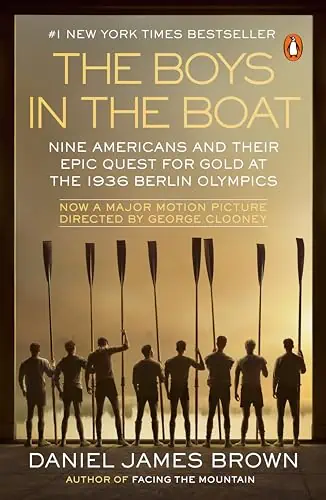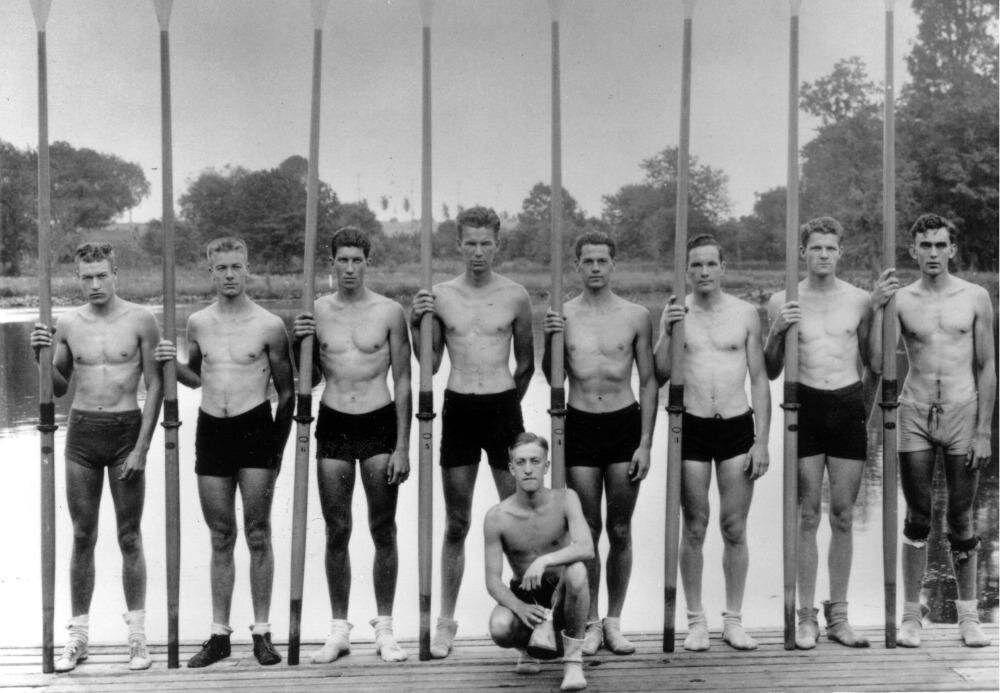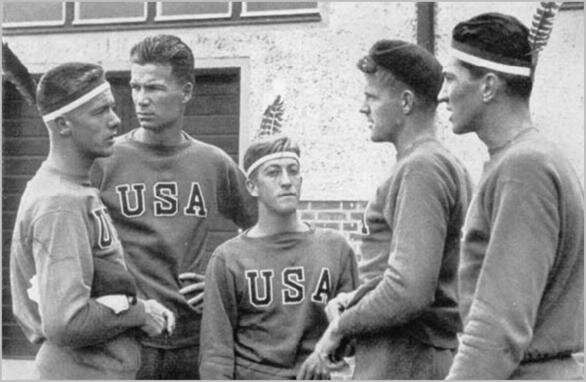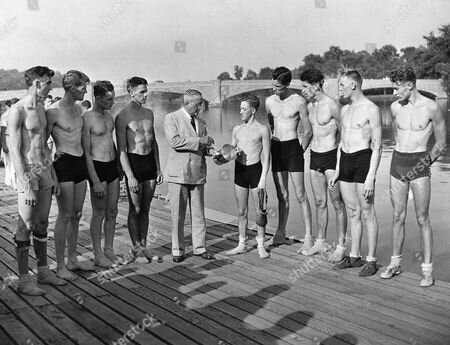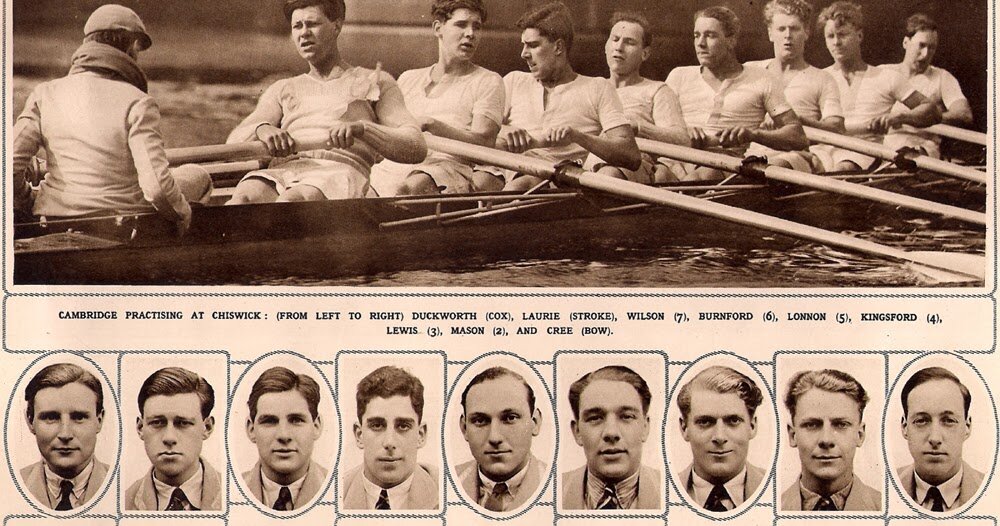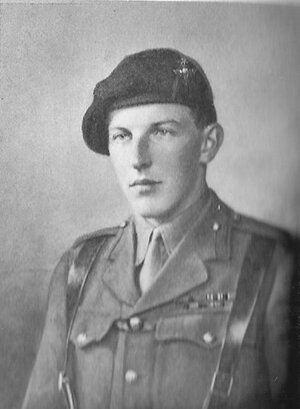When the gong sounded for men’s breakfast, Joe went to his assigned table and was disappointed to find that athletes were permitted to order only from a special restricted menu, designed, apparently, to feed canaries or coxswains.
If we are going to label it a sports book, then I am prepared to declare and defend Daniel James Brown’s The Boys in the Boat as a top-fiver. Put it alongside Paper Lion, Friday Night Lights, Sea Biscuit, and Into Thin Air or Moneyball or whichever other four you would like to include.
It is poetic and passionate prose. Brown’s style is simple and sensational, as smooth as the steady strokes of a world-class rowing team, and just as powerful. It is not preachy but, boy, will it preach. Life lessons and inspiration drip like honey from its pages.
This one is for the coxswains and the canaries of the world.
The Coxswain – a tiny titan
Coxswain (n) : The steersman of a ship’s boat, lifeboat, racing boat, or other boat.
The coxswain (/ˈkɒksən/ KOK-sən) is the person in charge of a boat, particularly its navigation and steering. The etymology of the word gives a literal meaning of ‘boat servant’ since it comes from cock, a cockboat or other small vessel kept aboard a ship, and swain, an Old English term derived from the Old Norse sveinn meaning boy or servant.
In 1724, a ‘cockswain’ was defined as ‘An officer of a ship who takes care of the cockboat, barge or shallop, with all its furniture, and is in readiness with his crew to man the boat on all occasions.’ When the term ‘cockboat’ became obsolete, the title of coxswain as the person in charge of a ship’s boat remained.
In the big boat of rowing, the heavyweight division, so to speak, and the size most fiercely followed in the Olympics and at prestigious universities and sports clubs around the world, there are eight rowers, each working one oar, and a coxswain. A coxswain is always a diminutive fellow because he is dead weight, contributing nothing to the rowing. Since, physically, he does not pull his own weight, the less he weighs, the better. He sits in the stern and is the only one facing forward. He is the captain of the boat, barking orders and encouragement to the rowers, keeping them on track, on pace, and setting the strategy by controlling the stroke rate of the row team. He is the little giant, sometimes half the size or weight of the rowers but their leader nonetheless. He is the banty rooster in a boat full of big, strong cock-a-doodle-doos.
When a rowing team wins a meet, it is tradition for the losing team to give their jerseys to the winners. It is also tradition for the winning team to toss the coxswain into the water and then fish him out. It takes a special person to be the physical runt of the bunch and yet command the boat with success. The team must trust his judgment implicitly and follow his instructions without deviation in order to succeed. They may do this and still lose, but failure to work in unison and adhere to a common game plan and strategy will bring disaster every time.
At the Berlin Olympics in 1936 – Hitler’s finest hour – there were two coxswains who would become legendary: America’s Bobby Moch and England’s John Noel Duckworth. They would each play their part in defeating Herr Hitler.
Making A “Mochery†of the Third Reich
The University of Washington winning the Olympic gold in Berlin is considered to this day the finest accomplishment of any Seattle sports team or organization ever. Forget The Seahawks and the Super Bowl. That is a huge deal, for sure, but it pales by comparison when you consider the way the eyes of the entire world were trained on Berlin in 1936 when tensions were building and Hitler was eyeing continental and world domination.
World War II was just around the corner.
No one played a bigger role in the unlikely, come-from-behind victory of a boat full of working-class boys over the greatest rowers in the entire world than little Bobby Moch.
No easy choice
At the start of the rowing season that year, the boat that Moch captained to glory was not even the varsity choice by University of Washington Coach Al Ulbrickson. But after he settled on that team, they rewarded their coach with an undefeated season in all of the big competitions, including the national championship in Poughkeepsie, New York, the Olympic trials, and the Olympics themselves.
Moch was the unquestioned leader of that group.
Moch’s team was the most inexperienced of Ulbrickson’s crews. Disappointed not to be chosen early on, the group came up with a chant while rowing: “LGB! LGB!”
When asked what it meant, they would each say it meant, “Let’s get better.” It really meant, “Let’s go to Berlin.”
Ulbrickson suffered great mental anguish in his decision regarding which boat to make Varsity. He knew that 1936 would likely define his career and legacy. As a rower at Washington, he had helped secure their last national championship in 1928. But as a coach, he lost two consecutive championship bids to their chief rival, the University of California.
the comeback kids
Moch and Ulbrickson did not take long to figure out they had something special in that boat. The boys were strong and unified. They were as much heart as grit.
Moch would be comfortable again and again having his boys pull easy in the early going of a race, setting the pace at 28 or 30 or 32 strokes per minute, while other teams tore out of the gate at paces of 36 or better. Then, in the home stretch, when the others began to fatigue and fade, his boys, still fresh as daisies would kick it up a notch and then another and then another, close the distance between themselves and the leaders, and then leave their opponents in their wake.
Each time without fail, it looked as if they would do nothing but fail. Fail, however, is the one thing they never did.
Hitler’s worst nightmare
Bobby Moch was Hitler’s worst nightmare.
Adolph was building his empire on the notion of Arian supremacy. The race he most detested, persecuted, and wished to eradicate from the face of the earth, of course, was the Jews.
Bobby’s dad was an emigrant to the United States from Switzerland. When Moch knew he was going to the Olympics in Europe, he asked his father for names and addresses of his relatives, so he could contact them while there and maybe pay them a visit. His father was less than enthusiastic. He told Bobby he would send him the names later. Bobby was confused by his father’s response but did not press him about it.
Moch was on the other side of the country in New York, preparing with his team for departure to Germany. Just before they would board an oceanliner named Manhattan, Bobby received a letter from his father back in Washington. The letter contained the names and addresses of his European relatives, just as promised. A second sealed letter was inside the envelope. It was labeled, Read this in a private place. Here is how Brown records the event…
The news was innocuous enough by twenty-first-century standards, but in the context of social attitudes in America in the 1930s it came as a profound shock. When he met his relatives in Europe, Gaston Moch told his son, he was going to learn for the first time that he and his family were Jewish.
Bobby sat under the tree, brooding for a long while, not because he suddenly found himself a member of what was then a much discriminated against minority, but because, as he absorbed the news, he realized for the first time the terrible pain his father must have carried silently within him for so many years. For decades, his father had felt that in order to make it in America it was necessary to conceal an essential element of his identity from his friends, his neighbors, and even his own children.
Germany swept the early rounds of rowing. The big prize, the eight-man boat with a coxswain prize, still dangled before him like a carrot before a jackass. When it was contested, Hitler and his entire inner circle would appear on the balcony of Haus West to watch. The crowd would greet the Fuhrer with Heil, Hitler, and chants of Deutschland! Deutschland!
Your cheating heart
Without adequate explanation, the lane draws for the event were completely in Germany’s favor. Despite finishing last in the preliminaries, they drew lane one, the one most protected from crosswinds and contrary waves, as it snugged more closely to the shoreline. Moreover, despite finishing first in the preliminaries and establishing a new course and Olympic time trial record, the Americans drew lane six, the one most exposed to the elements, the one Ulbrickson figured would mean a two-length disadvantage at best. Great Britain, the other future Allied force that would ultimately topple Hitler’s Nazi death grip, was in the second-worst lane, right next to the American boys.
Behind them and out of sight, the official starter suddenly emerged from his shelter, holding a flag aloft. The flag snapped wildly over his head for a moment. Almost immediately, he turned slightly in the direction of lanes one and two, shouted into the wind in one continuous, unbroken utterance, Etes-vous prets? Partez! and dropped the flag.
Bobby Moch never heard him. Never saw the flag. Neither, apparently, did Noel Duckworth. Four boats surged forward. The British boat and the Husky Clipper, for a horrific moment, sat motionless at the line, dead in the water.
Heil, Hitler? Nope. All Hail the Half-Pint!
Despite spending more than half of the race dead last, and despite the key rower, the pacesetter, Don Hume in the relentless grip of a month-log illness that left him so depleted he was carried to the boat by his teammates for the competition, The Americans made a last-minute surge for the ages, finishing six-tenths of a second ahead of second-place Italy and a full second ahead of Germany.
On the balcony of Haus West, Hitler turned and strode back into the building, unspeaking. Goebbels and Goring and the rest of the Nazi officials scurried in behind him.
In 1936, rowing was the second most popular Olympic sport behind only track and field. We know what Jesse Owens did to The Fuhrer’s Arian supremacy notion. Little did Hitler know that before that black man beat his pompous ass, a half-pint Jew took him to the woodshed without wielding so much as an oar.
Short of stature, great of heart
John Noel Duckworth was a preacher’s kid. He was born on Christmas Day, 1912, which is why his parents gave him Noel for a middle name. Rowing is a uniquely British sport and Duckworth is among its most legendary names. Duckworth coxed the champion Cambridge crews of 1934, 1935, and 1936, sweeping rival Oxford during his collegiate career.
His British team would finish a disappointing fourth in the Berlin Olympics, but Hitler’s Axis partner Japan would soon learn that the little guy was a big, big man.
In 1936, after competing in the Summer Games, Duckworth was ordained and appointed chaplain to the 2nd Battalion, Cambridgeshire Regiment. Duckworth’s rowing heroics was just the precursor of grander and nobler heroism to come.
Here is how Daniel James Brown tells it:
Short of stature, great of heart….The heart part he showed every time he took to the water. He would show it a a few years later in the South Pacific when, against orders, he stayed behind with wounded British soldiers as Japanese troops surrounded them. When the Japanese arrived and prepared to execute the wounded, Duckworth berated them so roundly that they beat him severely but spared his companions. They sent him to the infamous Changi POW camp in Singapore. Then they marched him and 1,679 other prisoners 220 miles through the jungle to the Songkurai camp in Thailand and put them to work as slave labor on the Thailand-Burma Railway.
Only 250 of the 1,679 prisoners would survive. The mighty-spirited, big-hearted, bigger-than-he-looked John Noel Duckworth would be one of the survivors.
Duckworth didn’t hold an oar but he holds a place in rowing lore. He didn’t fire a rifle but he was a war hero.
Noel Duckworth was a marvellous man who almost killed himself doing good I loved him for what he did to raise morale and for his lovely sense of humour and for just being himself.
John Noel Duckworth was one of those rare men who will always be remembered by everyone who ever met him. He had enormous charisma, great strength of will, but above all dedicated his life to the needs of others.
Shortly after the Berlin Olympics brought Hitler and the mighty coxswains together, the German and Japanese war machines would threaten the peace and order of the planet. At no other time in human history was the entire world at stake in a conflict. It took big, bold characters like Winston Churchill, Douglas MacArthur, and George Ol Blood-and-GutsPatton to bring the tyrants to their knees. They could not, however, have done so without the invaluable contributions of boys buried beneath white crosses on both continents, without the blood and guts of the little guy in the trenches, the canaries and the coxswains giving their all in the worst of conditions.
Little people with big hearts will always be bigger than big people with little hearts.
Here’s to the canaries and the coxswains and the difference they make in the world they encounter.
